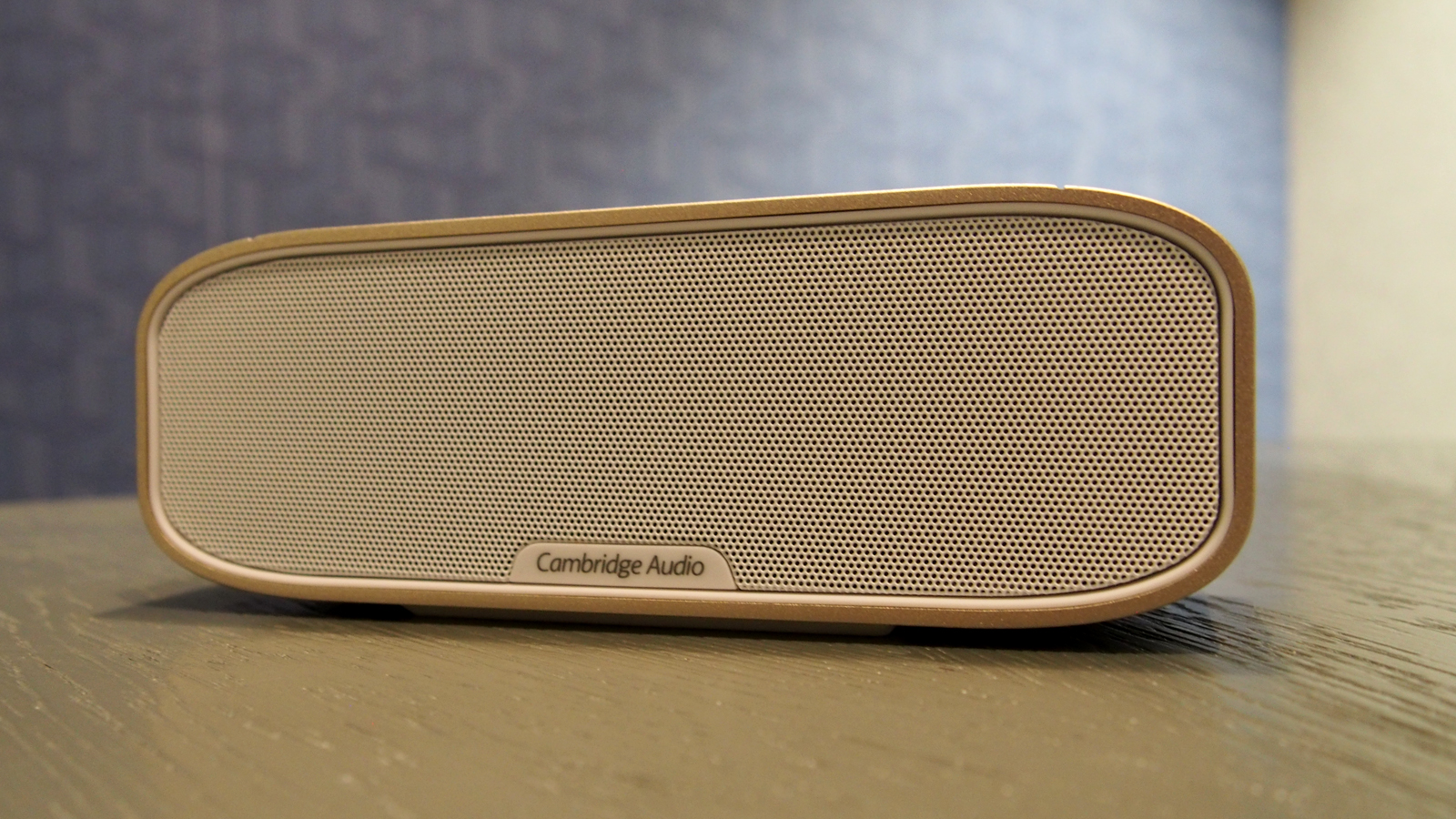TechRadar Verdict
Looks only go so far with the Cambridge Audio G2, a Bluetooth speaker boasting a stunning design that stumbles in some key areas. Fuller sound and charging over USB would have made this a must-have.
Pros
- +
Regal design
- +
Useful features
- +
Balanced sound
Cons
- -
Inconsistent performance
- -
Doesn't charge over USB
Why you can trust TechRadar
These days, it's not difficult to find a Bluetooth speaker that provides reliable connectivity, long-lasting battery, a conversation-sparking form factor and favorable sound. But it is harder to find options that do it for a decent price.
The British-engineered Cambridge Audio G2 looks to offer that, plus the kitchen sink, for a wallet-friendly $149 (£99, about AU$192). The G2 brings its A-game to design, but does it beat out the similarly priced competition in terms of sound and feature set?
Design
The Cambridge Audio G2 makes quite the visual impression. Our review sample is the "Champagne" color, splashed with accents of white and soft gold and silver that give the speaker a regal look.
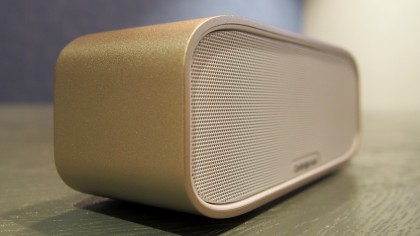
A seamless and gorgeous ring of aluminum wraps around the tall boy-sized unit. On the bottom, Cambridge Audio stuck a cream colored rubber pad to prevent slipping on uneven or slick surfaces.
Moving around the speaker, the perforated front metal grille covers the cabinet inside, which is comprised of two speakers and two bass radiators powered by a Class D amplifier. Another white-coated grille covers the back side, with a small compartment carved out for the I/O ports.
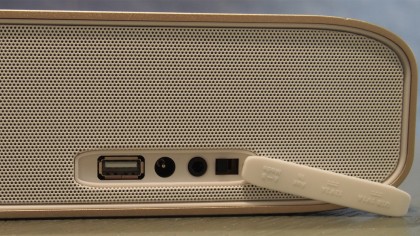
Lifting off the fitted rubber flap, four features come into play: the USB port for charging other devices, AC power, a 3.5mm input for wired listening and an A/B switch for wireless pairing with another G2.
A panel of button controls dominate the top of this Bluetooth speaker. This lineup is covered in the same rubbery material that prevents the bottom from slipping, and each button offers a finger-friendly concave indent. The panel is comprised of par-for-the-course buttons, like volume control, Bluetooth discovery, and power. But a few useful additions include a button to pick up calls and another to switch input sources from wireless to wired.
Sign up for breaking news, reviews, opinion, top tech deals, and more.
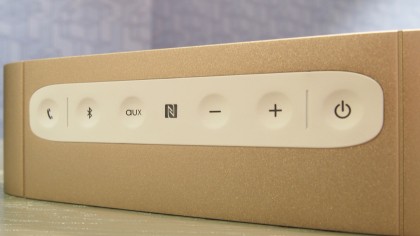
The G2 is small, enough so that it should meet your requirements for portability. However, unlike most speakers of this size, it's dense and much heavier than it looks. Sure, you can still take it anywhere you please, but with such a classy design and the heft tacked on, the Cambridge Audio G2 is better suited as a stay-at-home wireless solution.
Included with the purchase is the power adapter, which comes with swappable prong formats - Type C, Type G and Type A. Also included is a cream tote bag with drawstrings to help keep it protected from scratches during transport.
Performance
At this point, it's no secret that the Cambridge Audio G2 Bluetooth speaker is a looker. It performs great too, but how does it sound? For a TL;DR, glazed-over version of the type of sound that comes from this tiny package, here we go: well balanced, but restrained.
Diving in deeper, bass is present, but a bit subdued in its definition. An abundance of lows and mids in the signature provide a really warm sound, but one that acts to step over itself when it comes to highs, sounding muffled at times. For a $150 Bluetooth speaker, we're getting serviceable, but not remarkable performance.
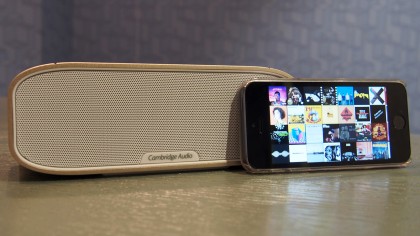
A song that accurately highlights the balanced accuracy of the G2 is "Mojo Pin" by Jeff Buckley. The whispery guitar work and vocals come through gently, as does the climactic 4-minute mark when the rest of the band rushes in. Conversely, "Addiction" by Kanye West loses its backing groove as soon as the verse steps right over the bass beat. At its worst, the G2 never sounds bad, but it rarely surpasses the level of sounding undeniably like a small speaker.
Speaking on battery life, the G2 had no problem meeting its advertised 10 hours of continuous playback. Charging via the AC power adapter is a quick affair, but it's a real drag that it can't be charged over USB. That omission puts a dampening on the unit's portability.
Connecting via NFC or through Bluetooth is easy, and the connection strength is robust. The speaker works without a hitch 20 to 25 feet away from my phone. The speakerphone function came in handy several times and works as intended.
Lastly, the A/B switch is a feature that only really comes into play if you own a second G2. It allows them to pair, providing a stereo sound wirelessly.
We liked
The Cambridge Audio G2 is a slick device that stands to create waves in the Bluetooth speaker market if only for its delectable build quality.
For $150, you're getting a fully-featured Bluetooth speaker, complete with several handy abilities like hands-free calling, NFC-connectivity, 10-hour battery and device charging via USB.
We disliked
The tech specs, although impressive, don't come together to serve up the impressive audio performance that I had hoped for.
It's a real downfall that the G2 can't be charged over USB. Why would I bring this anywhere if I knew I couldn't charge it once it kicked the bucket?
Final verdict
It may be a daunting task to find a $150 Bluetooth speaker as good-looking as the Cambridge Audio G2. But it won't be as hard to find one that fills in the blanks left by its balanced, but throttled sound performance.
The G2 gets a lot right, but falters in some major areas. While the Harman Kardon Esquire Mini is about on par in regards to sound quality, it can charge via USB and is loaded with the same features, but packed into a smaller form factor for the same price.
If price is a concern, check out the very affordable Dell AD211. It's a solid $60 speaker that can also perform tons of functions, but loses out when it comes to sound quality by comparison.
Casual listeners of music or podcasts will be delighted with the G2's mature look, ease of use and sound quality. However, this Cambridge entry will leave most serious listeners wanting more in the way of a fuller sound.

Cameron is a writer at The Verge, focused on reviews, deals coverage, and news. He wrote for magazines and websites such as The Verge, TechRadar, Practical Photoshop, Polygon, Eater and Al Bawaba.
